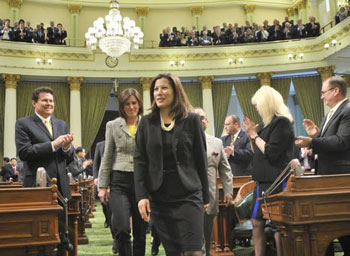Chief justice laments historic cuts to California court
system
By Amy Yarbrough
Staff Writer
Using the landmark U.S. Supreme Court Gideon
v. Wainwright case as a backdrop, Chief Justice Tani Cantil-Sakauye urged
lawmakers in Sacramento last month to restore funding to the judicial branch –
or risk jeopardizing access to justice in California.
 |
| Members of the Judicial Council of California, the policy-making body for the judicial branch, and the Bench-Bar Coalition stand on the balcony as the Chief Justice enters the Assembly Chamber — Photo courtesy of the California Judicial Branch. |
Cantil-Sakauye’s annual State of the Judiciary address
delivered to the Legislature on March 10 came just days before the 50th anniversary of the case, which guaranteed that all criminal defendants have
access to a lawyer, regardless of their ability to pay for one. The case continues
to teach us about the importance of attorneys to the justice system,
Cantil-Sakauye said, and also “something as fundamental as how necessary a
courtroom is as a forum for justice.
“To have your day in court, you need a courtroom. And I
will say that what we once counted on, that courts would be open and ready and
available to deliver prompt justice, is no longer true in California,”
Cantil-Sakauye told legislators. “Although California has the distinction of
being the largest judiciary in the country, we also have the dubious distinction
that our judicial branch budget has been cut greater and deeper than any other
in the United States.”
In the last five years, the judicial branch’s budget has
been cut by roughly $1 billion, forcing courts to reduce their services and
shutter courtrooms. Gov. Jerry Brown did not call for any operational cuts in
his 2013-14 budget proposal, but has targeted $200 million set aside for court
construction projects.
Using court construction money to stave off further trial
court cuts will mean that courthouses in need of repair or replacement will
remain neglected, Cantil-Sakauye said. Although increased court fines and fees
have also helped prevent “catastrophic” court closures, their long term impact
could be very detrimental, she said.
“All of us are concerned that the higher fines and higher
penalties are falling on those least able to afford it,” she said. “I worry
that California is on the wrong side of history in funding justice.”
State Bar President Patrick Kelly, who attended
Cantil-Sakauye’s address, said the chief justice did a great job of outlining
the risks posed to the justice system as well as the long-term damage
underfunding of the courts could have on Californians. The chief justice also
challenged the Legislature “to give the justice system the highest priority in
funding decisions lest we lose the justice Californians have come to rely
upon,” he said.
Kelly said restoring court funding should be “our highest
priority.”
“We, as members of the bar, have a duty to support measures
that guarantee access to our courts. Because we have been the
beneficiaries of such a comprehensive court system in the past, it is easy to
forget how integral it is to our daily lives,” he wrote in an email. “However,
every right we have is meaningless unless there is a prompt and responsive
justice system available to enforce those rights.”
Kelly also spent time in Sacramento meeting with state
lawmakers as a member of the Open Courts Coalition, a volunteer group made up
of litigators from both the plaintiffs’ and defense bars. He said the elected
officials seem to understand what’s at stake in the court-funding crisis.
In her speech, Cantil-Sakauye noted that since 2010, 30
courts have reduced their hours of operation, 22 courthouses have closed and
114 courtrooms shut their doors. Los Angeles County has plans this year to
close 67 courtrooms, eliminate 500 positions and shutter the largest
alternative dispute resolution department in the nation. Court employees in
Kings County even went so far as to hold a garage sale this year to raise money
for the court, she said.
Cantil-Sakauye finished with the story of Clarence Gideon,
the plaintiff in the historic Gideon case who was falsely accused of
burglarizing a Florida pool hall, but was went to jail anyway because he was too
poor to hire an attorney. At his first trial, Gideon was convicted and
sentenced to five years in prison. Doing his own research, Gideon petitioned
the U.S. Supreme Court and was granted a second trial, where an attorney was
able to help him with his ultimate acquittal.
Gideon died a free man a few years later, Cantil-Sakauye
told legislators, reading a quote from Gideon’s gravestone taken from a letter
he wrote to his lawyer.
“It says each era finds an improvement in law for the
benefit of mankind. That’s the faith Mr. Gideon had in government,”
Cantil-Sakauye said. “As you, the decision makers, sort through all the
pressing needs of the state I urge you to reinvest in justice. I urge you to
think about the judicial branch and the forum for justice that it provides to
interpret and enforce the laws that you pass. Think of Mr. Gideon, think of
justice for all.”